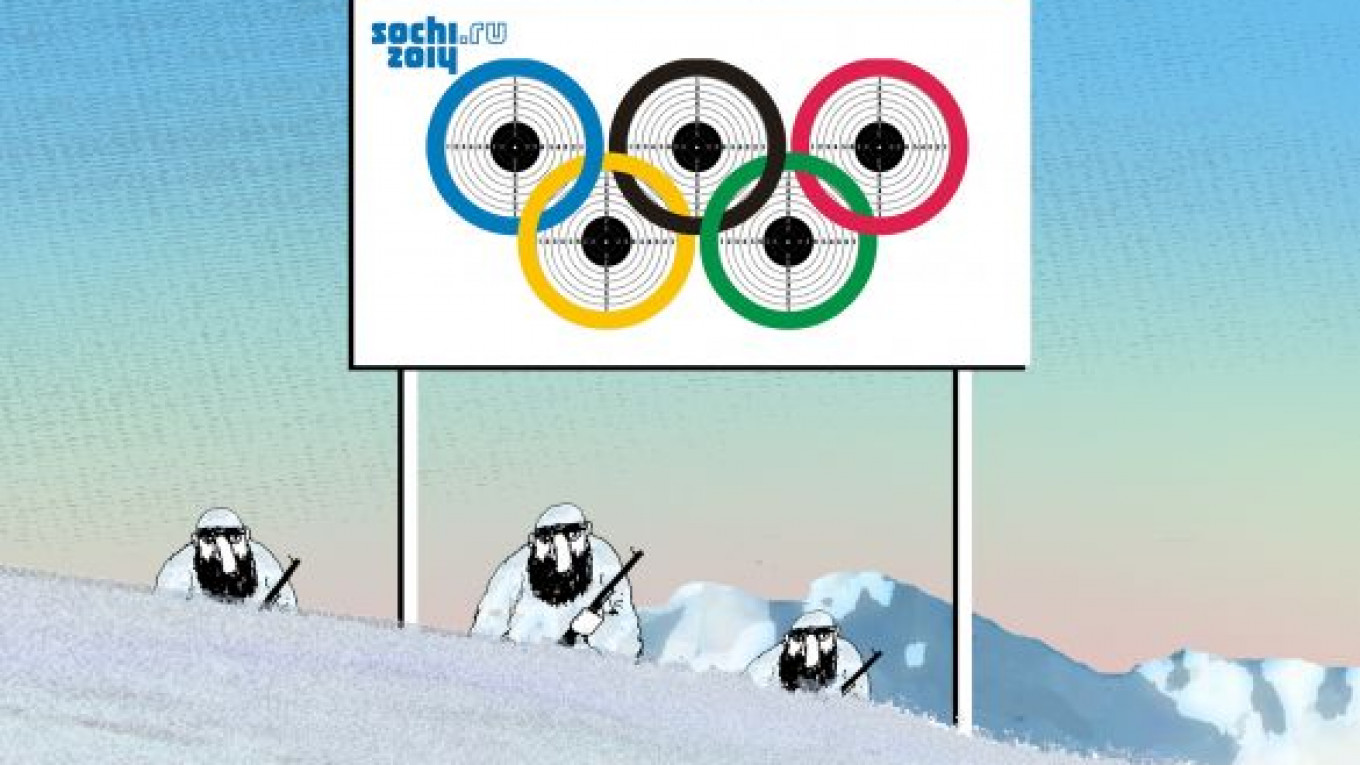The bombings in Volgograd just before New Year's Eve have shown that the terrorist threat in Russia remains extremely high. Both of these attacks had been carefully prepared beforehand. Following a bus bombing in October and the bombing of the Volgograd train station, Russian intelligence agencies were unable to prevent the third attack: another bus bombing killing dozens. Authorities still have not identified those who ordered those attacks, and with less than one month remaining before the Winter Olympics in Sochi, the issue of safety of the participants and guests of the Games has come to the fore.
The threat is ever greater and more serious in light of the fact that Doku Umarov, head of the Islamic extremist group Caucasus Emirate, released a video in July calling on his followers to disrupt the Winter Olympics and ending the moratorium on terrorist attacks in Russia, including attacks against civilians. It is very likely that the Caucasus Emirate organized the series of attacks in Volgograd as a response to Umarov's recent statements.
The Caucasus Emirate wants to establish an Islamic Sharia-based state in the North Caucasus and even beyond, and it has declared jihad against all infidels.
The creation of the Caucasus Emirate has fundamentally changed the nature of armed groups and terrorist organizations in the North Caucasus. For many years before that, insurgents in the region followed a separatist ideology aimed against the "Moscow occupiers." Now they have adopted the ideology of radical Islamism and jihadism. The Caucasus Emirate wants to establish an Islamic Sharia-based state in the North Caucasus and even beyond, and it has declared a holy war against all infidels. The militants refer to themselves as mujahedeen, the same name once used by insurgents in Afghanistan.
The Caucasus Emirate has no definite boundaries and does not recognize the division of the North Caucasus into its current national republics. The emirate claims to be the only legitimate authority wherever mujahedeen are found. Just as he denounced the upcoming Olympics in Sochi, Umarov labeled the earlier Universiade in Kazan as "satanic games" and called on the Muslims of Tatarstan to oppose it. There is information that Caucasus Emirate militants are also found in Bashkortostan and several other regions of the Volga.
The extremist Islamist jihadist movement in the North Caucasus, with Umarov at its head, has long considered itself part of the global Islamic Ummah, or community. It has expressed solidarity with militant Islamists fighting in Afghanistan, Palestine, Iraq and Somalia, and considers not only the Moscow Kremlin its enemy, but also the U.S., Britain, Israel and "all others who wage war against Islam and Muslims." Published reports also indicate that Arab terrorists with close ties to al-Qaida have heavily influenced Umarov.
Umarov's statement that the Sochi Games are a "Satanic dance on the bones of our ancestors" means that terrorists might well consider the upcoming Olympics an ideal target. After all, the event will bring together athletes and journalists from around the world, and a successful terrorist attack in Sochi would have a huge and devastating impact. Umarov has called on militants to disrupt the Games by staging attacks in Sochi. Chechen President Ramzan Kadyrov responded to that threat by vowing to eliminate Umarov before the start of the Games. But Kadyrov has not succeeded.
Suicide bombers are the most formidable weapon available to terrorists. These living bombs can cause extensive damage, as happened recently in Volgograd. According to reports, the Caucasus Emirate has a special unit devoted to preparing suicide bombers: the so-called "Garden of the Righteous." In the last 12 years, 46 suicide bombers — mostly women — have staged 26 terrorist attacks in Russia. These include Moscow metro bombings in 2010 and the downing of two planes in flight in 2004.
Russia has suffered enormous losses from terrorist attacks. According to estimates by U.S. Caucasus specialist Gordon Hahn, from 2007 to 2012, the first five years that the Caucasus Emirate existed, terrorists staged more than 2,200 attacks that claimed the lives of 1,800 soldiers and officials along with 450 civilians. More than 3,500 people were injured.
Russia, the U.S. and the United Nations Security Council have all listed Umarov as a most-wanted terrorist and the Caucasus Emirate as one of the world's most dangerous terrorist organizations. Moreover, the U.S. State Department has offered up to $5 million for his capture, Nonetheless, Umarov continues to prepare new attacks and even sometimes vacations and gets medical treatment in Turkey.
The terrorist attacks in Volgograd in December showed that huge gaps remain in Russia's security infrastructure, even though one-third of federal budget expenditures go to the army and security forces. With Sochi located in the volatile and dangerous North Caucasus, we can only hope that the Federal Security Service can protect the Olympic Games from terror and death.
Vladimir Ryzhkov, a State Duma deputy from 1993 to 2007, is a co-founder of the opposition RP-Party of People's Freedom.
A Message from The Moscow Times:
Dear readers,
We are facing unprecedented challenges. Russia's Prosecutor General's Office has designated The Moscow Times as an "undesirable" organization, criminalizing our work and putting our staff at risk of prosecution. This follows our earlier unjust labeling as a "foreign agent."
These actions are direct attempts to silence independent journalism in Russia. The authorities claim our work "discredits the decisions of the Russian leadership." We see things differently: we strive to provide accurate, unbiased reporting on Russia.
We, the journalists of The Moscow Times, refuse to be silenced. But to continue our work, we need your help.
Your support, no matter how small, makes a world of difference. If you can, please support us monthly starting from just $2. It's quick to set up, and every contribution makes a significant impact.
By supporting The Moscow Times, you're defending open, independent journalism in the face of repression. Thank you for standing with us.
Remind me later.








